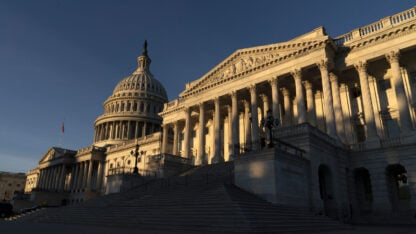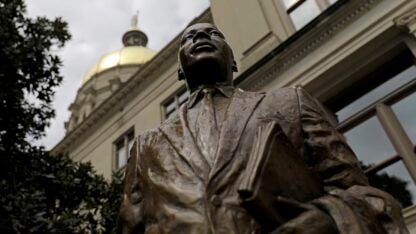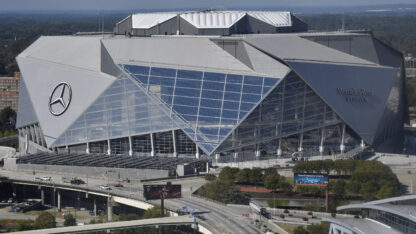WABE sent questions about environmental issues to all of the mayoral candidates. The questions cover climate change and extreme heat, water resources, park maintenance, the tree ordinance and lead contamination in West Atlanta neighborhoods.
The questions are in bold, and Glenn Wrightson‘s answers follow. Answers were edited for clarity.
Read answers from other candidates.
The U.S. Environmental Protection Agency recently expanded the area in English Avenue and Vine City where properties may need to have their soil completely removed and replaced, after finding dangerous levels of lead in people’s yards.
What role do you think the City of Atlanta should have in engaging with the community, and what is your plan to address this potential children’s health issue in West Atlanta neighborhoods?
I am familiar with remediation issues.
Children generally like to play in the dirt – which should be good to create/build natural immunities.
I shall adhere to any and all guidelines and measures promoted by the EPA including actions taken as the Westside site is now [proposed to be] included in the National Priorities List.
Aside from fully cooperating with the EPA – I shall encourage parents to direct their children to play, with supervision, in their local park until the EPA advises the remediation efforts are successful.
As mayor, I shall instruct the traffic department to accommodate all remediation work.
While Atlanta has some big, beautiful new parks opening now and coming soon, many city parks need maintenance. According to the Park Department’s long-term planning program, Atlantans said the number one thing discouraging them from using their parks was that they were not well maintained.
How would you ensure that parks — whether they’re new or old, big or small, regardless of the neighborhood — get adequate funding and maintenance? And how would you involve communities in decisions about their parks?
I shall allocate more money thru the city’s budget process to parks – The funding needs to be increased – ramped up substantially – in anticipation of the maintenance responsibility of the BeltLine will shift to the parks and recreation department in 10 years. I shall engage the NPU’s and conservancies to participate in major park-related decisions.
Atlanta is losing its tree canopy, and the city has taken years to finish a promised re-write of the tree protection ordinance.
How would you make sure the ordinance update is completed, and ensure that it is enforced?
I shall not kick the can on proposing a revised tree ordinance – and ask the city council to adopt the new ordinance within 6 months of taking office.
Atlanta is hot and getting hotter. Often the hottest neighborhoods are in vulnerable communities of color. Atlanta also has many households with high energy burdens that pay a high proportion of their income to energy bills. Not everyone can afford to run the air conditioner all summer or afford efficiency upgrades to keep their homes cooler — and heat can be dangerous.
What role do you see for the mayor’s office in addressing the health risks of extreme heat?
I shall seek to have Georgia Power Co. encourage solar energy panels be installed.
The city could intervene in the next Georgia Power Co.’s rate case – seeking a reduction of the summer/winter rate differential for low incomes households. This is different than budget billing.
I shall open the cooled recreational facilities to those in need. And, I shall ask the APS to also have portions of the schools’ facilities made available to those in need.
To address climate change, the City of Atlanta prepared a climate action plan in 2015 on how to cut emissions. The city also made a commitment to achieve 100% clean energy by 2035. But progress towards that goal has been slow.
What, if anything, would you do to keep Atlanta moving towards emissions reductions? And how would you prepare Atlanta communities to weather the effects of climate change, which include extreme heat, increased flooding, mosquito-borne disease and worsening air quality?
I shall replace smaller city vehicles with electric vehicles (EV) – and seek to amend zoning requirements to include EV charging stations. I shall, with the council’s approval, restrict gas-powered leaf blowers, plastic grocery bags, and start building the street cars transit.
Promote the use of rain barrels – and conservation. I shall create a major recycling center – and seek to employ/house the homeless to sort the materials – I shall install a truck and auto tire shredding facility to make roadway asphalt. We could make our own asphalt to resurface roadways. Accepting used tires would reduce mosquitos.
Georgia won a major legal victory in the water wars in the U.S. Supreme Court earlier this year, but there is still another case ongoing. And, Florida, Georgia and Alabama have not found a resolution between themselves. Metro Atlanta is subjected to both floods and droughts — both of which climate change will likely worsen — and we must share our limited water supply within the region and with downstream neighbors.
As the mayor of Atlanta, how would you see your role in addressing and preparing for the region’s water challenges?
I will promote the use of rain barrels. Restrict outdoor water usage as needed. First study and possibly separate sections of the combined stormwater-wastewater system to return rainwater to local streams.
I would promote conservation measures at every opportunity.
I shall promote educating the public on the virtues of conserving our resources.
(On a personal note – I wash clothes with rainwater and rinse them with tap water – I know the importance of conservation.)
Read answers from other candidates.








